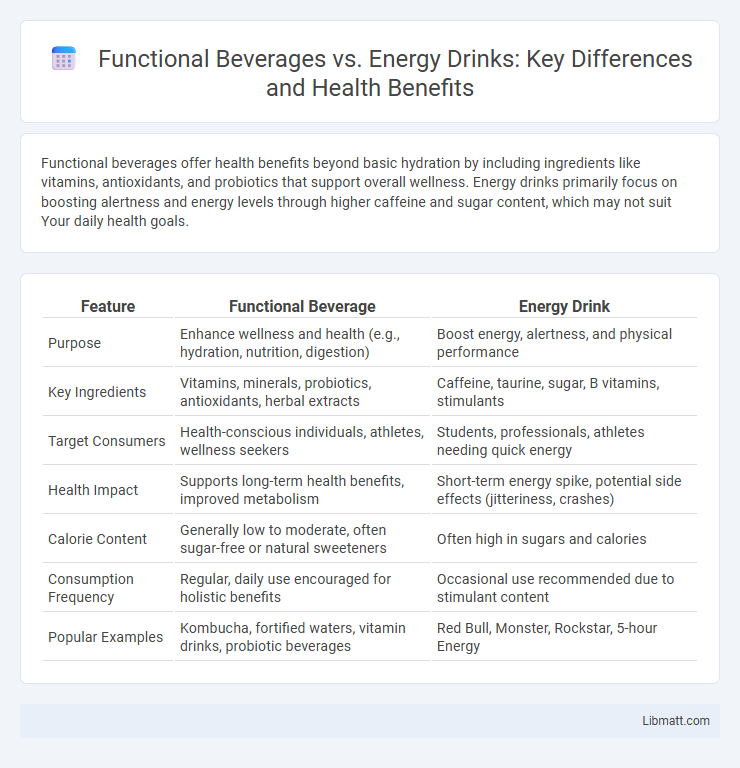Functional beverages offer health benefits beyond basic hydration by including ingredients like vitamins, antioxidants, and probiotics that support overall wellness. Energy drinks primarily focus on boosting alertness and energy levels through higher caffeine and sugar content, which may not suit Your daily health goals.
Table of Comparison
| Feature | Functional Beverage | Energy Drink |
|---|---|---|
| Purpose | Enhance wellness and health (e.g., hydration, nutrition, digestion) | Boost energy, alertness, and physical performance |
| Key Ingredients | Vitamins, minerals, probiotics, antioxidants, herbal extracts | Caffeine, taurine, sugar, B vitamins, stimulants |
| Target Consumers | Health-conscious individuals, athletes, wellness seekers | Students, professionals, athletes needing quick energy |
| Health Impact | Supports long-term health benefits, improved metabolism | Short-term energy spike, potential side effects (jitteriness, crashes) |
| Calorie Content | Generally low to moderate, often sugar-free or natural sweeteners | Often high in sugars and calories |
| Consumption Frequency | Regular, daily use encouraged for holistic benefits | Occasional use recommended due to stimulant content |
| Popular Examples | Kombucha, fortified waters, vitamin drinks, probiotic beverages | Red Bull, Monster, Rockstar, 5-hour Energy |
Introduction to Functional Beverages and Energy Drinks
Functional beverages are formulated with ingredients such as vitamins, minerals, antioxidants, and botanicals to promote health benefits beyond basic nutrition. Energy drinks typically contain high levels of caffeine, sugar, and other stimulants designed to enhance mental alertness and physical performance. Both categories serve distinct consumer needs, with functional beverages focusing on wellness support and energy drinks targeting immediate energy boosts.
Defining Functional Beverages
Functional beverages are designed to provide specific health benefits beyond basic nutrition by incorporating ingredients like vitamins, minerals, probiotics, and herbal extracts. Unlike energy drinks, which primarily aim to boost energy and alertness through stimulants such as caffeine and sugar, functional beverages target overall wellness, hydration, and immune support. Your choice between these options should consider the purpose, as functional beverages offer sustained health advantages rather than immediate energy spikes.
What Sets Energy Drinks Apart?
Energy drinks differentiate themselves from functional beverages through their high caffeine content, typically ranging from 80 to 300 milligrams per serving, which provides a rapid boost in alertness and energy. They often include ingredients like taurine, guarana, and sugar to enhance stimulant effects and improve physical performance. In contrast, functional beverages focus more on health benefits such as hydration, nutrition, and digestive support without the intense stimulant properties found in energy drinks.
Key Ingredients in Functional Beverages vs Energy Drinks
Functional beverages typically contain natural ingredients like adaptogens, vitamins, antioxidants, probiotics, and herbal extracts designed to promote overall wellness and cognitive support. Energy drinks usually feature high levels of caffeine, sugar, taurine, and B vitamins aimed at providing rapid energy boosts and increased alertness. Your choice depends on whether you seek sustained health benefits or immediate stimulation.
Health Benefits: Functional Beverages Compared to Energy Drinks
Functional beverages often contain natural ingredients like vitamins, minerals, and antioxidants that support hydration, immune function, and overall well-being, whereas energy drinks typically rely on high caffeine and sugar content, which can cause jitters and energy crashes. Your choice of functional beverage can enhance health without the adverse effects associated with energy drinks, such as increased heart rate or insomnia. Prioritizing functional beverages helps maintain balanced energy and nutrient levels while promoting long-term health benefits.
Target Consumers and Lifestyle Fit
Functional beverages target health-conscious consumers seeking specific benefits such as hydration, digestion support, or enhanced immunity, often aligning with active lifestyles focused on wellness and prevention. Energy drinks appeal primarily to individuals needing quick boosts in alertness and performance, such as students, athletes, or professionals facing intense mental or physical demands. Your choice depends on whether you prioritize sustained health benefits or immediate energy and stimulation for active, fast-paced routines.
Market Trends: Growth of Functional Beverages vs Energy Drinks
The global functional beverages market is expected to grow at a CAGR of around 8% from 2023 to 2030, driven by increasing consumer demand for health-enhancing ingredients like probiotics, antioxidants, and vitamins. In contrast, the energy drinks segment shows a slightly slower growth rate of approximately 6%, as concerns over high caffeine and sugar content influence consumer preferences. You can observe a shift toward functional beverages that offer holistic wellness benefits beyond energy boosts, reflecting a broader trend in health-conscious consumption.
Safety Concerns and Potential Side Effects
Functional beverages typically contain natural ingredients, vitamins, and minerals, posing lower safety risks compared to energy drinks, which often have high caffeine and sugar levels that can cause increased heart rate, anxiety, and sleep disturbances. Energy drinks may also lead to dehydration and elevated blood pressure, raising concerns for individuals with cardiovascular conditions. Consumers are advised to monitor intake and consult health professionals to avoid adverse side effects related to excessive consumption.
Regulatory Differences and Labeling
Functional beverages and energy drinks face distinct regulatory frameworks primarily due to differences in their ingredients and intended uses. Functional beverages often fall under dietary supplement or food categories, requiring ingredient transparency, health claims substantiation, and compliance with agencies like the FDA or EFSA. Energy drinks, classified as either dietary supplements or conventional beverages depending on jurisdiction, are subject to stricter labeling mandates that include caffeine content disclosure, warnings about potential health risks, and age restrictions in some regions.
Choosing the Right Drink for Your Needs
Functional beverages provide targeted health benefits through ingredients like vitamins, antioxidants, and adaptogens, making them ideal for hydration and wellness support. Energy drinks typically contain higher caffeine and sugar levels designed to boost alertness and physical performance quickly but may lead to jitters or crashes. Selecting the right drink depends on your goals: opt for functional beverages to enhance overall health and recovery, while energy drinks suit immediate energy demands.
Functional beverage vs energy drink Infographic

 libmatt.com
libmatt.com